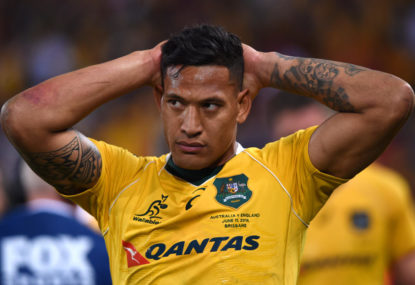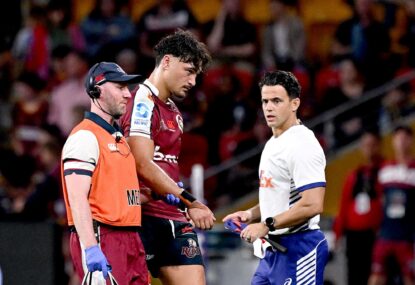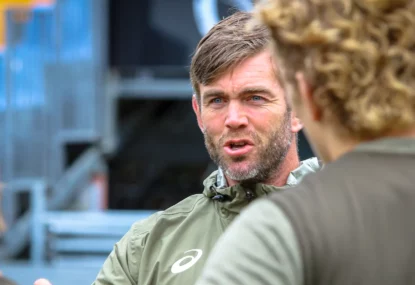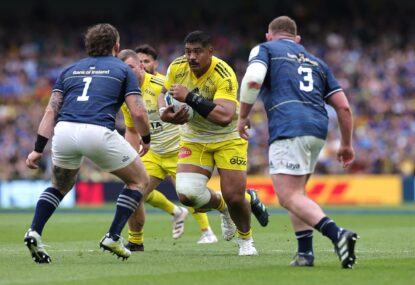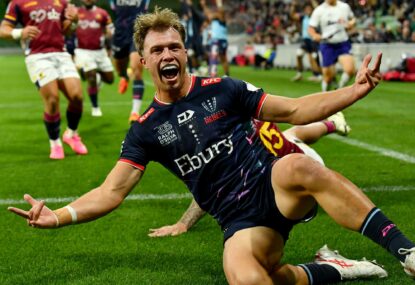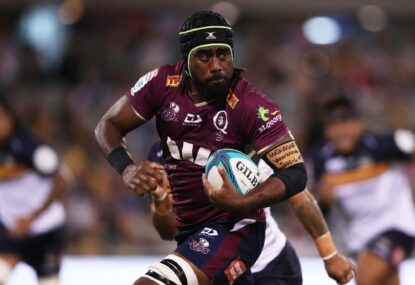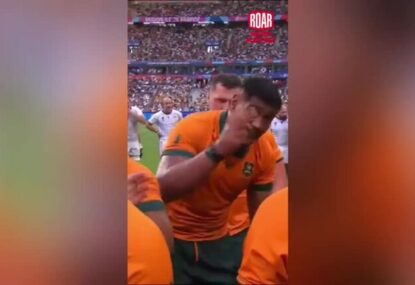You can make all the excuses in the world, but at the end of the day an ‘L’ is put down for the Wallabies’ efforts against the Irish.
The men from the Emerald Isle emerged from the scrapheap victorious, defeating the Australians 27–24 in Dublin.
In a seesawing affair a decimated Ireland backline limped home, almost squandering a 17-point lead, and so the tourists’ hopes of a Grand Slam slipped away.
After a monster effort from late starting inclusion Josh van der Flier at number 7, the Wallabies were on the wrong end of a 13–3 penalty count.
Despite ending the game with three openside flankers, the Wallabies were unable to compete with the Irish influence at the breakdown, who played with an aggressive fervour for most of the match.
Ireland dominated the match’s first quarter, enjoying 70% of possession, however Australian desperation and scrambling defence limited them to a slim penalty lead. The men in green relentlessly attacked Henry Speight’s wing, exposing holes down the defensive left-hand side.
Yet it was not until immediately after the departure of Dean Mumm to the sin bin in the 23rd minute for dangerous play that the locals were able to find the line. Relishing the opportunity any tight fiver loves, with open space and no one in front of him, Irish lock Iain Henderson stormed home to give Ireland their first five-pointer.
Appearing to be destined to trudge into the sheds 17 points behind, the Australians hit back on the halftime mark through Dane Haylett-Petty.
Crippled in the opening exchanges by the ball finding the turf more often than Wallaby hands, the Force winger finished off some effectively simple inside running lines and support play at pace to score under the posts.
Fuelled by what must have been an impassioned plea from coach Michael Cheika, Australia came out firing in the second half. Recently recovering his usual charging form, big centre Tevita Kurindrani touched down in the corner, scoring his fourth try in as many matches, the start of their dominance in the third quarter of the match.
A Pocock breakdown infringement gifted the Irish three-points, however an immediate impact was felt by replacement winger Sefanaia Naivalu who ran around to score in the middle.
Ultimately, despite the mood of having their tails up the Wallabies allowed their short-lived lead to lapse, with Irish wingers Zebo and Earls combining to dot down. The conversion took the gap to the eventual final score of 27–24, and the clock was against Australia, who were unable to weasel their way to a win as they have done so many times in the past.
A side is only as good as its depth, and Ireland certainly proved that, scraping home against last year’s World Cup finalists.
Potentially hamstrung by injuries, including the loss of star players Sean O’Brien and Jonathon Sexton, the Irish patched together a formidable side that would in due course dash Australian dreams of an unbeaten European tour.
While holding their own in the opening exchanges, eventually the Australian scrum yet again fell victim to a Northern Hemisphere scrum.
The anchor of an envious front row, the Irish hooker Rory Best stood up and out in with 100th cap with a classic captain’s knock, besting his opposing number and skipper.
Similar to that of Argentinian number 2 (and captain) Agustine Creevy, Best supplements his backrow, almost playing as an addition flanker.
Ireland’s inspirational captain topped it off with a try-saving tackle on Australian centre Reece Hodge, to claw the Wallabies down when hot on attack.
Similarly leading by example, coming on as an early replacement after finding himself on the bench this week, electric winger Simon Zebo was dangerous every time he touched the ball.
A much-improved second half was not enough to see the Wallabies home. There were however positives aplenty to take away from the match, including improved clean out accuracy at the break down and the recently discovered second row depth evident.
Rory Arnold consistently charged over the gain line, and Rob Simmons appears to have found the aggression his head coach was looking for, attacking rucks and assailing Irish attackers with intensity.
While the influence of Pocock at the breakdown was all but nullified, Michael Hooper’s never ending motor was evident, surging across the field in another standout performance. While not without potential improvements, the 25-year-old Waratah’s consistency is unsurpassed in World Rugby.
The Wallabies were made to pay for an enormous penalty count, including two yellow cards, as well as simply appearing to not wanting a victory as much as their opponents.
As the match closed out, and Australia was looking to sniff out a last gasp victory, the ball and anyone holding it were swarmed by a very aggressive cloud of green. They were unable to make the most of their limited opportunities, highlighted by what is seemingly becoming a sparing event for Folau.
After shrugging off a couple of defenders to find space, his pass could not find the supporting man, and as such a rare chance went begging. Unsurprisingly, the lopsided penalty count was consequently almost outnumbered by Australian handling errors, and turnovers conceded told a similar story, reading 19 to Ireland’s mere six.
Heads went down both on the pitch and from blanketed couches of Australia, as simple execution let them down with a potentially delicious rematch with England next week looming.
Ireland would consider themselves unlucky not to find themselves as favourites heading into the upcoming Six Nations, supplementing their unprecedented win against the previously unbeaten New Zealanders with today’s win.






























































































